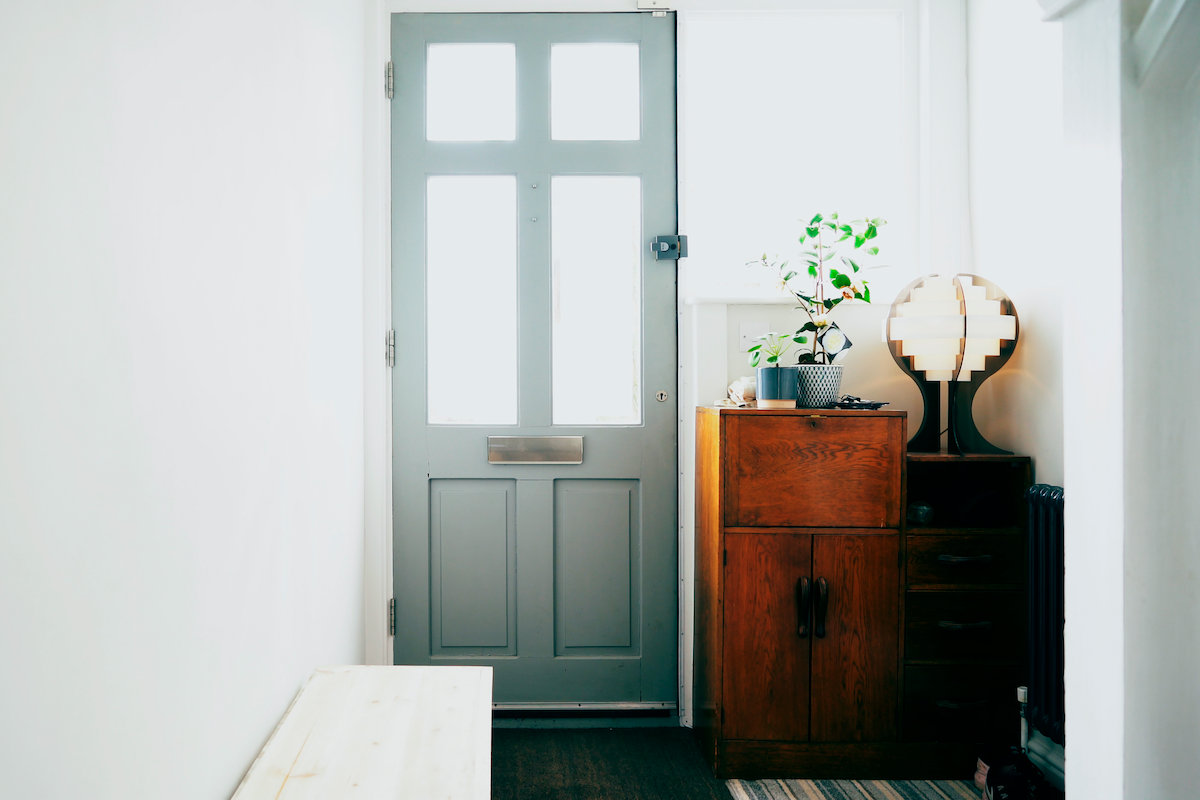No Space Too Small is a column by Laura Fenton that celebrates the idea that you can live well in a small home. Each month, Laura will share her practical findings from years of observing how people live in tight spaces, and her own everyday experiences of living small — from the hunt for the perfect tiny desk to how to manage clutter.
At just 690 square feet, my apartment is relatively small, but it dates back to the 1940s, when apartments were laid out with grander proportions. Once a one-bedroom, we converted it to what New York City real estate brokers call a "junior two-bedroom." Even though we altered the intended floor plan, there are a few other vintage elements to our home's design that help make our space work, including our entryway.
Measuring 8 feet by 10 feet, our entryway is as large as our second bedroom, and while some people might not consider this a proper room, it takes up a relatively large amount of our square footage. However, it is a relatively empty room. In the space, we have a sideboard and mirror and a bench. The walls are adorned with mirrors and art, which make it feel decorated and inhabited, but it's the most empty room in our home. As a result, visitors love to speculate about how we could make better use of the space.
Friends and family suggest we could build bookcases, use it as a new location for our dining table, add a desk, or, heck, even install a Murphy bed for visitors — I've heard it all! And while the idea of a wall of custom bookcases is appealing, it's just not in the budget (I settled for IKEA in the "dining room" instead). Besides, I'm in no rush to "make the most" of this room. In fact, its emptiness is the key to making the rest of our small space work. Here's why.
Our foyer flexes to serve many purposes, including a staging zone for my photographer husband's photo equipment before jobs (and also for packed bags before trips), a makeshift shipping center when my books have come out, costume-making central come Halloween, and parking for strollers, scooters, and other vehicles at different stages of my kid's life (right now we've got a scooter and a skateboard).
Having a space at the ready for these events that occur relatively frequently is a lifesaver. It also keeps the rest of the apartment from descending into chaos: It means I can say yes to the garbage-truck costume assembled from three large boxes or the hand-me-down skateboard without thinking twice.
I'm not the only one luxuriating in my empty space: My friend Shira Gill, the author of Minimalista, once described the empty shelf in her home as a "luxury," and I immediately longed for my own empty shelf. Shira keeps one shelf perennially empty in order to house items that temporarily need a home.
Likewise, when I was reporting a story about how professional organizers organize their own homes, Monica Leed, the founder of Simply Spaced, told me that the secret to her tidy home office is a large basket that she leaves empty on a low shelf, so she can tidy up quickly. (It also comes in handy for stashing packages she hasn't opened or returned yet.) Shira also keeps an empty basket in her entrance, which she calls her "outbox;" permanently placed in her entryway; it's a way station for anything on its way out the door (library books, packages, borrowed items to be returned).
Even if you can't spare most of a room like I have, think about where you might be able to create your own flex space: Could you create an empty shelf, cabinet, or drawer, like Shira? Or maybe just a single empty basket that you can fill in a pinch, like Monica has? We're often encouraged to declutter to remove the excess, but I think there's some value in going further, to leave a little blank space on our bookcases and in our closets. Empty space buys our future selves room to breath and grow.
If you've got a home that still has some empty space, resist the feeling that you should fill it with something. Instead, try relishing in the possibility of what you might fill it with someday!




Shares